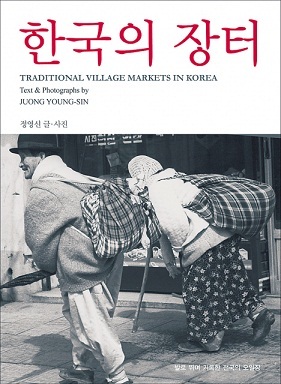 |
A scene from Moran Market in Seongnam, Gyeonggi Province, in January 2010. (Noonbit Archive) |
Juong Young-sin’s photo essay captures Korea’s traditional markets over a quarter of a century
Photographer and author Juong Young-sin has been taking photographs of Korea’s regional traditional markets for 25 years.
“I just wanted to meet people, and the local market is where you go when you want to do that,” she tells The Korea Herald. “Markets also tell you stories of the real people.”
Though she has now published her collection of essays, Juong was only an aspiring writer in 1986. She was deeply discouraged after not winning a writing contest that same year. Juong took a break from writing and traveled across the country to experience each province’s traditional markets. After doing that for a year, she decided to take photographs and capture the lives of the markets’ people.
Juong’s recently-published book, “Traditional Village Markets in Korea,” chronicles her 25 years spent at the markets. Throughout the years, she’s visited more than 80 markets in nine different provinces, including Gangwon, Jeolla, Jeju, Gyeongsang, and Chungcheong provinces.
All of the photographs are shot in black and white, and feature the people of the markets. Most of them are aged, as they are the only ones who work and shop in the regional marketplace ― instead of retail and online stores.
Juong has had a number of unforgettable moments. In 1988, she ran into an old lady who was selling a small amount of dried persimmons in a small market in Gurye, South Jeolla Province. “You should try this,” the lady told Juong. “I dried the fruits for my grandson. But he never came, so I’ve decided to sell them here. No other dried persimmons can taste better than this.”
 |
The cover of author and photographer Juong Young-sin’s “Traditional Village Markets in Korea.” |
“And it really did taste good,” Juong says. “That’s the kind of experience you get only at the markets. You get to buy fruits that have stories.”
Also in 1988, Juong ran into an old lady who dug up herbs in the mountains and sold them at a market in Cheongyang, South Chungcheong Province.
“I ran into the same lady in 2011 at the same market, on a cold, snowy winter day,” Juong says. “I found out that she turned 96 that year. Turns out, she’d been doing the same thing since 1988. She’d dig the herbs every day, and would be the first person to show up at the market. It was extremely touching to run into her again.”
Juong’s photos are moving. There’s a mother breastfeeding her child, women bargaining over vegetables and fish, and old ladies carrying potatoes and pumpkins. The portraits are almost journalistic in their representation, and artistically resonant. The faces of old men and women, as well as the regional market scene, are compelling because of the knowledge that many of them will soon be gone.
That is probably why Juong still goes out, almost every week, to take photos of more markets. “I still have about 300 more markets to go,” she says.
“The markets I visit are very small, most of the time. These old men and women come to markets not necessarily because they want to sell or buy things, but because they miss being with people. And that’s what we all miss in the end.”
By Claire Lee (
dyc@heraldcorp.com)









